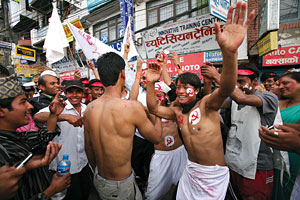 KIRAN PANDAY |
You can take that with a pinch of salt since bankers are obviously not the Maoist core constituency. But the same evening, a civil society activist, with sympathy for the Maoist agenda, commented, "I have just got back from villages in Kabhre and Sindhuli where even Maoist voters are disillusioned. What was the point of the war if JP Gupta and Krishna Bahadur Mahara are doing the same thing in government?"
Talk to an urban resident and he will crib about the power and price crisis. A poor rural family will talk about the food shortage. In any of the ethnically charged regions (eastern hills, eastern Tarai, and western Tarai) there is insecurity, alienation and deteriorating inter-community ties. And the educated unemployed will ask that perennial question: where are the jobs? The Maoists will get the flak because they are in charge.
But this doesn't mean the Maoists are completely discredited. A young migrant worker visiting his home in Chitwan said: "Everyone is out to ensure they do not succeed. Give the Maoists a chance and freedom to work. There is peace in the districts."
The Maoist leadership point at the finance ministry's track record: revenues are up, minimum wages have increased and labour is relieved. Old people are being given pensions. VDC grants have increased. Self employment schemes have drawn crowds of young people and Baburam Bhattarai's integrity is hard to question.
As for things they have not been able to do, the Maoists point out they inherited a mess. And then they blame the bureacuracy, coalition partners, NC, army and internationals, especially India.
So the judgement is mixed. But any discussion on Maoist 'failure' has to first confront the question: what does failure mean in this context. Is it the failure, as a government, to give direction to the country? Is it failure to meet standards of the middle class and do what Kathmandu elite expected them to? Is it failure to live up to their own promises and deliver to their own base? Is it failure, as a party, to enhance power?
The paradox is that the Maoists have become immensely stronger in eight months of being in power even as their public credibility has dented, even if partially.
So they have succeeded in keeping the party intact, creating opportunities for their cadre, infiltrating the state, co-opting even erstwhile adversaries, delivering benefits to their core working class base and making money. But they have not changed the patronage culture of politics or focussed on providing public goods to a wider constituency.
They have not politically engaged with groups in the districts whose resentment against Kathmandu is turning into militancy, letting a general sense of drift pester. And instead of being reconcilers, they have tried to maximise advantages for the party.
This is because after winning the elections, the Maoists changed track. If earlier they reached out to all those disaffected and angry at the state in a bid to assume power, the Maoists now began focussing on using the state in a bid to consolidate.
Critics will say it shows all the Maoists wanted was power for power's sake, not to bring about change. But there is a deeper theoretical underpinning. Classical Marxism in principle talks about state control as necessary to advance a particular class interest. For Maoists who make no distinction between the party and the class it claims to represent, this means using the state to advance party's influence and interests.
But what the Maoists miss here is that most people who voted for them in the last elections were not party members. The party faithful may stick on even though fissures are now emerging inside. But the supporters outside that framework are getting frustrated. Their challenge is to tackle growing disillusionment among this broader coalition that propelled them to power.



